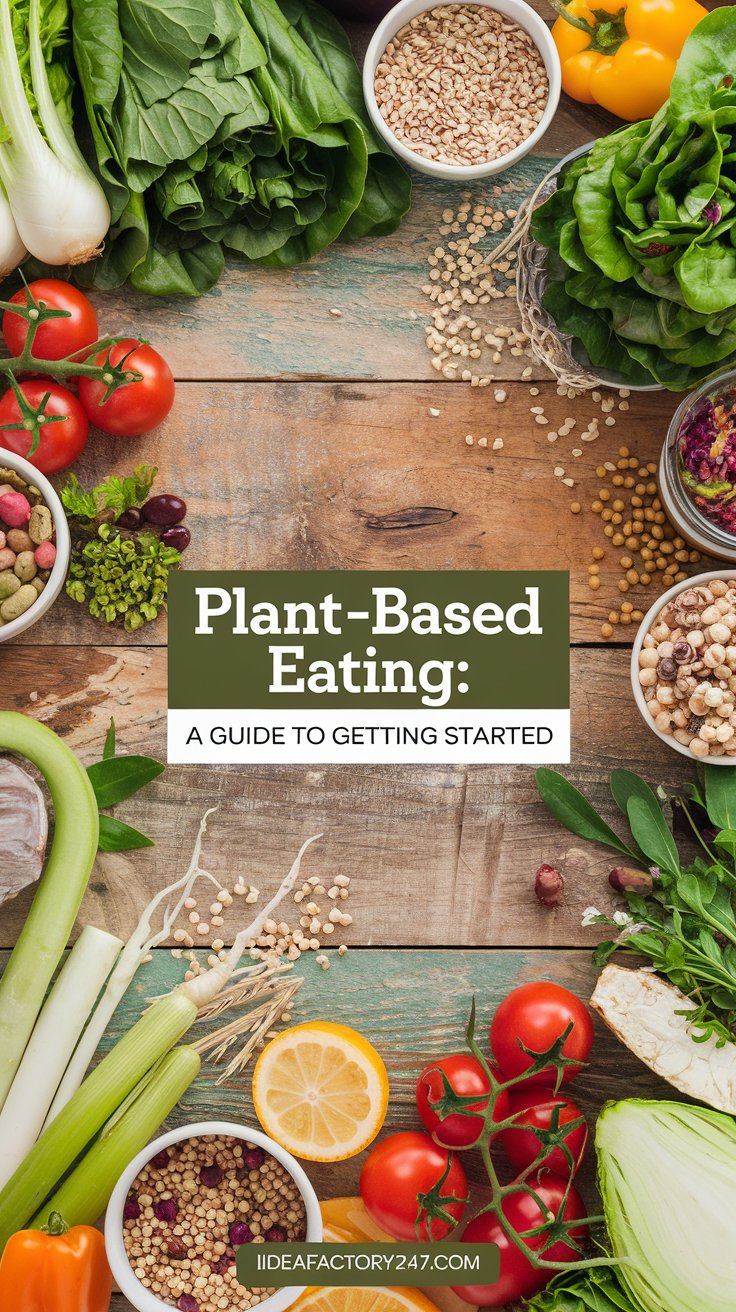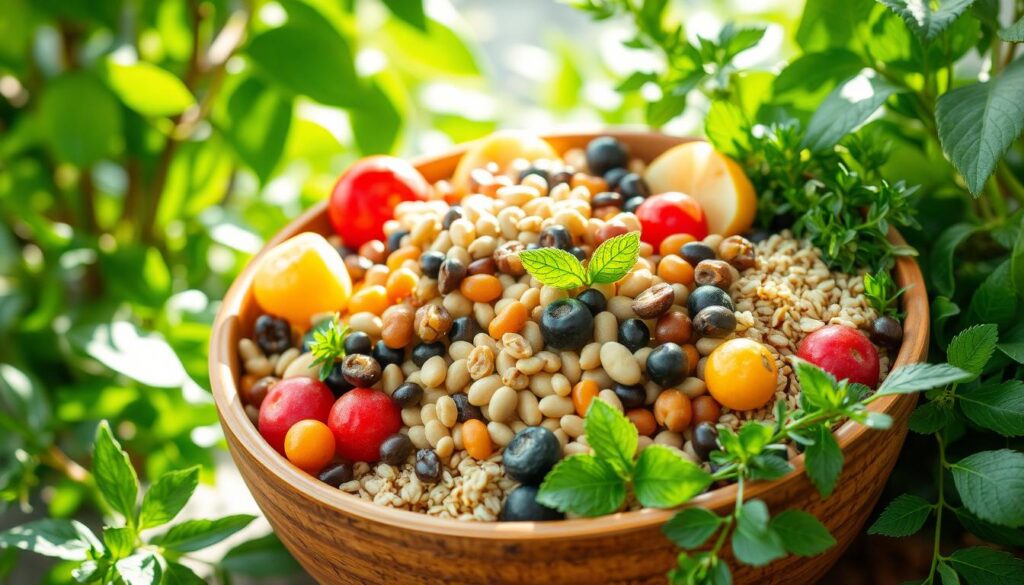
This website uses cookies to ensure you get the best experience on our website. View our Privacy Policy here.

Share this article via:
Please note: This website contains affiliate links. As an Amazon Associate, we earn from qualifying purchases at no additional cost to you.
.
Plant-based diets have a long history, from ancient Greece to today’s wellness movement. They include vegan, vegetarian, and flexitarian eating patterns. These diets focus on whole foods like vegetables, fruits, grains, nuts, seeds, herbs, and spices.
By learning about different plant-based diets, whole food living, and common myths, you’ll make better choices. So let’s get started an explore the basics, benefits, key foods, and tips for starting a plant-based lifestyle.

The world of plant-based eating is vast and diverse. It includes many dietary approaches for different tastes and needs. From vegan’s strictness to flexitarian’s flexibility, knowing these options is crucial. It helps you choose a diet that fits your personal goals.
Vegan diets exclude all animal products, like meat, dairy, and eggs. Vegetarian diets might include dairy and eggs. Flexitarian diets mainly focus on plants but allow for some meat or fish.
Whole food plant-based eating focuses on foods that are minimally processed and full of nutrients. This includes fruits, vegetables, whole grains, legumes, and nuts. It aims to give you all the vitamins, minerals, and fiber you need. It also helps you avoid refined carbs, added sugars, and unhealthy fats.
Many think plant-based diets lack protein. But, with careful planning, you can get enough protein from plants. Also, people often think plant-based diets are boring. But, with so many whole foods and creative meal ideas, you can enjoy a wide variety of dishes.
| Dietary Approach | Animal Product Inclusion | Key Principles |
|---|---|---|
| Vegan | Excludes all animal-derived products | Emphasizes whole, minimally processed plant-based foods |
| Vegetarian | Includes dairy and/or eggs | Emphasizes whole, minimally processed plant-based foods |
| Flexitarian | Primarily plant-based with occasional meat or fish | Focuses on a wide variety of whole, minimally processed plant-based foods |
Learning about plant-based diets helps you make a choice that suits you. It can lead to a healthier and more sustainable lifestyle.
Choosing a plant-based diet can bring many health benefits. It helps with weight management and improves heart health. It also lowers the risk of type 2 diabetes and other chronic diseases.
Plant-based diets are full of fiber, vitamins, and minerals. They are also rich in phytonutrients. These diets are low in saturated fats and cholesterol. Studies show they can lower blood pressure and reduce inflammation.
A case study showed big improvements in 16 weeks on a plant-based diet. The patient’s blood pressure went down, and their HbA1C and total cholesterol levels improved. They also needed less medication.
Plant-based eaters have a lower risk of death from heart disease. Adding more plant foods as an adult can also lower mortality risk, research finds.
Starting a plant-based lifestyle is easier than you think. Begin with vegetarian recipes you know. Use familiar ingredients and try new meatless meals. This way, you can easily add these healthy habits to your daily life.
| Benefit | Finding |
|---|---|
| Weight Management | A review of 87 studies found that a vegan or vegetarian diet is highly effective for weight loss, with vegetarians experiencing a weight loss of approximately 1 pound per week without the dependency on exercise. |
| Heart Health | Vegetarians were found to have lower rates of heart disease, high blood pressure, and obesity compared to non-vegetarians. A diet emphasizing local, plant-based ingredients is considered more environmentally friendly than diets relying heavily on mass-produced animal products. |
| Diabetes Prevention | Plant-based diets may help slow cognitive decline and reduce risks of developing diabetes, with a 34% lower risk of diabetes in those following a plant-based eating pattern. |
| Chronic Disease Risk | Consuming less meat decreases the risk of heart disease, stroke, obesity, high blood pressure, high cholesterol, type 2 diabetes, and many cancers. Following plant-based diets has shown people losing 4.5 pounds (2 kg) over an average of 18 weeks compared to non-vegetarian diets. |

The evidence is clear: a plant-based diet leads to a healthier life. It focuses on whole foods for better weight management, heart health, diabetes prevention, and less risk of chronic diseases.
Starting a plant-based diet means filling your kitchen with key foods. You’ll need protein-rich foods, whole grains, and lots of fruits and veggies. A well-stocked pantry is crucial for tasty and fulfilling meals.
Legumes like lentils, peas, chickpeas, and beans are vital. They’re not just cheap but also packed with nutrients. Tofu, tempeh, and seitan are great for adding more protein to your dishes.
Grains such as quinoa, brown rice, oats, and whole wheat pasta are must-haves. They give you energy and are full of fiber and vitamins. Legumes make them even more nutritious. For those with gluten issues, amaranth, mung bean threads, and quinoa pasta are good alternatives.
It’s important to have a variety of fruits and veggies. Leafy greens, cruciferous veggies, berries, and citrus fruits are key. They’re full of antioxidants and vitamins. Dried fruits, nuts, and seeds are also great additions.
With these essential foods, you can make delicious, healthy meals. They’ll keep you nourished and happy.
Starting a plant-based diet can be easy or challenging, depending on you. The main thing is to take it one step at a time. Begin by adding more plant-based meals to your week. Try going meatless one day or making plant-based breakfasts a habit.
Try out new recipes and foods that are naturally plant-based. You’ll find they can be very tasty and filling. This way, you can enjoy fruits, veggies, whole grains, and legumes without getting bored.
When eating out, look for places with plant-based options. This is a great way to try new foods and flavors. Also, planning your meals and doing some prep work can make your transition smoother. It helps you eat well without relying on processed vegan foods.
Remember, it’s okay if you’re not perfect right away. Changing to a plant-based lifestyle takes time. It might take a few weeks or months, but it’s worth it. With a bit of creativity and a willingness to try new things, you’ll start to see the health benefits of eating plants.
Plant-based diets go back to ancient Greece. They include vegan, vegetarian, and flexitarian eating patterns.
A plant-based diet is based on whole foods. This includes vegetables, fruits, grains, nuts, seeds, herbs, and spices.
They’re popular for their health benefits, environmental impact, and ethical reasons.
Vegan diets don’t include animal products. Vegetarian diets might include dairy and eggs. Flexitarian diets mostly eat plants but sometimes include meat or fish.
It focuses on eating foods that are minimally processed. It avoids refined grains and added sugars.
Some think they lack protein or variety. But with the right planning and education, these concerns can be overcome.
They help with weight management, improve heart health, and lower the risk of type 2 diabetes.
A good plant-based kitchen has protein-rich foods, whole grains, fruits, vegetables, nuts, seeds, and plant-based milks.
You can start gradually or switch completely. Trying new recipes and cuisines helps with the transition.
Please note: This website contains affiliate links. As an Amazon Associate, we earn from qualifying purchases at no additional cost to you.
.
Share this article via:

This website uses cookies to ensure you get the best experience on our website. View our Privacy Policy here.